This episode was recorded Friday, February 23, 2024
Co-hosts: Kate Huber and Aubrey Streit Krug
FEATURED GUESTS/WORKS:
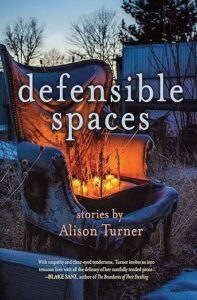 Alison Turner, Defensible Spaces
Alison Turner, Defensible Spaces
This collection of short stories visits a small Colorado mountain town living with the constant possibility of wildfire. Preparation for and mitigation of wildfire is a metaphor in this narrative world — how much personal control do we have as interconnected social beings? — as much as a physical, environmental reality.
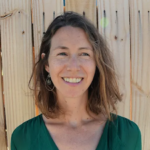 Alison Turner grew up in the mountains of Colorado, where she learned to endure large amounts of time in inclement weather waiting for buses. Her creative work appears in Blue Mesa Review, Wordrunner eChapbooks, Little Patuxent Review, Meridian, and Bacopa Literary Review, among others, and her first collection of short stories, Defensible Spaces, was published by Torrey House Press in 2023. She is a 2022-2024 ACLS Leading Edge postdoctoral fellow in Jackson, Mississippi, where she coordinates a community-based oral history project and facilitates creative writing workshops with writers incarcerated at Parchman State Penitentiary.
Alison Turner grew up in the mountains of Colorado, where she learned to endure large amounts of time in inclement weather waiting for buses. Her creative work appears in Blue Mesa Review, Wordrunner eChapbooks, Little Patuxent Review, Meridian, and Bacopa Literary Review, among others, and her first collection of short stories, Defensible Spaces, was published by Torrey House Press in 2023. She is a 2022-2024 ACLS Leading Edge postdoctoral fellow in Jackson, Mississippi, where she coordinates a community-based oral history project and facilitates creative writing workshops with writers incarcerated at Parchman State Penitentiary.
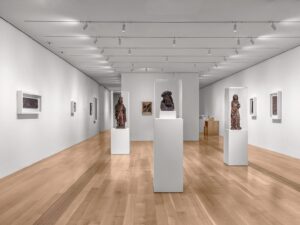
Installation view of The Nature of Things: Medieval Arts and Ecology, 1100–1550 at the Pulitzer Arts Foundation, March 10¬–August 6, 2023. Photography by Alise O’Brien Photography, © Pulitzer Arts Foundation and Alise O’Brien Photography
Heather Alexis Smith, The Nature of Things: Medieval Art and Ecology, 1100-1550
The Nature of Things is the first ecocritical exhibition of medieval art. Featuring a range of materials, this exhibition reveals how the industries that artists relied on—forestry, quarrying, mining, and farming—affected landscapes throughout Europe, Africa, and Asia. It also examines how environmental conditions (botany, geology, climate, hydrology, and topography) played an active role in the production of works of art.
 Heather Alexis Smith is Assistant Curator at the Pulitzer Arts Foundation in the Grand Center Arts District in midtown St. Louis. She earned her BA in art history from the University of Florida, and her MA in art history and archaeology from the University of Missouri-Columbia, where she focused on the art of the later Middle Ages. Since joining the Pulitzer in 2016, Heather has worked on a variety of exhibitions, with topics ranging from the destruction of artworks in ancient Egypt, drawing in 19th century Japan, and the practices of modern sculptors Ruth Asawa and Terry Adkins. For today’s ASLE Spotlight, Heather will discuss her most recent exhibition, The Nature of Things: Medieval Art and Ecology, 1100-1550, which investigates the intrinsic connections between art, people, and the environment in the second half of the European Middle Ages.
Heather Alexis Smith is Assistant Curator at the Pulitzer Arts Foundation in the Grand Center Arts District in midtown St. Louis. She earned her BA in art history from the University of Florida, and her MA in art history and archaeology from the University of Missouri-Columbia, where she focused on the art of the later Middle Ages. Since joining the Pulitzer in 2016, Heather has worked on a variety of exhibitions, with topics ranging from the destruction of artworks in ancient Egypt, drawing in 19th century Japan, and the practices of modern sculptors Ruth Asawa and Terry Adkins. For today’s ASLE Spotlight, Heather will discuss her most recent exhibition, The Nature of Things: Medieval Art and Ecology, 1100-1550, which investigates the intrinsic connections between art, people, and the environment in the second half of the European Middle Ages.
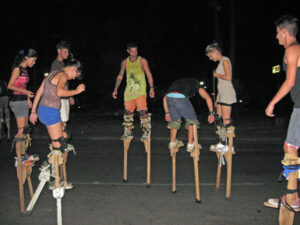 David Taylor, Cuban Earth
David Taylor, Cuban Earth
Cuban Earth documents David Taylor and Melinda Levin’s work with Teatro Callejero Medio Ambiental (TECMA) — street performers for the environment — and is based in Pinar del Río in western Cuba. Taylor and Levin were struck not only by the group’s artistry and mission, but also how it crafts costumes out of reusable materials from local landfills and gives opportunities to at-risk youth in the community.
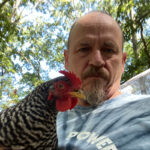 David Taylor is an Associate Professor and Faculty Director of the Environmental Humanities track in the Sustainability Studies Program in the School of Marine and Atmospheric Sciences at Stony Brook University. His writing crosses disciplinary boundaries and genres—poetry, creative nonfiction, scholarship, and science writing; however, at the core of his work always is a concern for environmental sustainability and community. He is Lead Editor and Contributor, An Island in the Stream: Ecocritical and Literary Responses to Cuban Environmental Culture (Lexington Books, 2019). David has traveled to Cuba for over 10 years collaborating with writers, artists, and scholars at Consejo Nacional Artes Escenicas (CNAE), Fundación Antonio Núñez Jiménez de la Naturaleza y el Hombre, Union Nacional Escritores y Artistas Consejo (UNEAC)–Cuban national writers’ organization, and the Department of Geography at the University of Havana. Upcoming books include: Theaters of Engagement (under contract with University of Wyoming Press), and Paddling Around Paumanok: A Kayak Trip Around Long Island to Home.
David Taylor is an Associate Professor and Faculty Director of the Environmental Humanities track in the Sustainability Studies Program in the School of Marine and Atmospheric Sciences at Stony Brook University. His writing crosses disciplinary boundaries and genres—poetry, creative nonfiction, scholarship, and science writing; however, at the core of his work always is a concern for environmental sustainability and community. He is Lead Editor and Contributor, An Island in the Stream: Ecocritical and Literary Responses to Cuban Environmental Culture (Lexington Books, 2019). David has traveled to Cuba for over 10 years collaborating with writers, artists, and scholars at Consejo Nacional Artes Escenicas (CNAE), Fundación Antonio Núñez Jiménez de la Naturaleza y el Hombre, Union Nacional Escritores y Artistas Consejo (UNEAC)–Cuban national writers’ organization, and the Department of Geography at the University of Havana. Upcoming books include: Theaters of Engagement (under contract with University of Wyoming Press), and Paddling Around Paumanok: A Kayak Trip Around Long Island to Home.
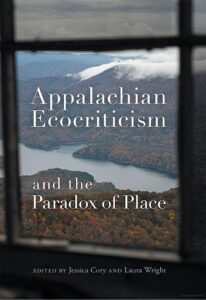 Jessica Cory, Appalachian Ecocriticism and the Paradox of Place (Use code 08APPECO for 30% off this title at checkout. View Appalachian EcocriticismFlyer)
Jessica Cory, Appalachian Ecocriticism and the Paradox of Place (Use code 08APPECO for 30% off this title at checkout. View Appalachian EcocriticismFlyer)
Appalachian Ecocriticism and the Paradox of Place is the first book-length ecocritical examination of Appalachian literature. While the book is a scholarly collection of essays, these essays engage with Appalachian community issues that extend far beyond the academy, including climate and land-based issues, such as mountaintop removal mining, flooding, and farming.
 Jessica Cory teaches in the English Department at Appalachian State University and is a PhD candidate specializing in Native American, African American, and environmental literatures at the University of North Carolina, Greensboro. She is the editor of Mountains Piled upon Mountains: Appalachian Nature Writing in the Anthropocene (WVU Press, 2019) and the co-editor (with Laura Wright) of Appalachian Ecocriticism and the Paradox of Place (UGA Press, 2023). Her creative and scholarly writings have been published in the North Carolina Literary Review, North Dakota Quarterly, Northern Appalachia Review, and other fine publications. Originally from southeastern Ohio, she currently lives in western North Carolina.
Jessica Cory teaches in the English Department at Appalachian State University and is a PhD candidate specializing in Native American, African American, and environmental literatures at the University of North Carolina, Greensboro. She is the editor of Mountains Piled upon Mountains: Appalachian Nature Writing in the Anthropocene (WVU Press, 2019) and the co-editor (with Laura Wright) of Appalachian Ecocriticism and the Paradox of Place (UGA Press, 2023). Her creative and scholarly writings have been published in the North Carolina Literary Review, North Dakota Quarterly, Northern Appalachia Review, and other fine publications. Originally from southeastern Ohio, she currently lives in western North Carolina.
